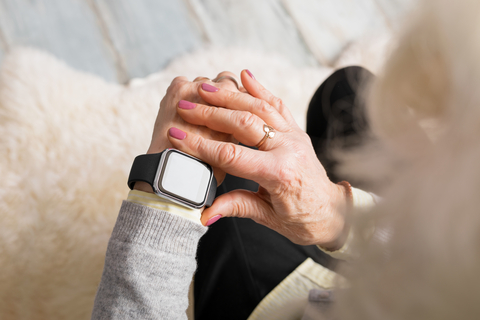A Parkinson’s watch is being given to patients with the condition, in an effort to improve NHS remote monitoring
The Parkinson’s Kinetigraph (PKG) is designed to be worn around the clock for six days to allow physicians to monitor patients’ movements at home. Wearable tech is a growing market, with items like the Fitbit and Apple watch becoming mainstream accessories – wearable healthcare technology has a good platform for growth.
Led by Dr Camille Carroll, an associate professor in Neurology at the University of Plymouth and an Honorary Consultant Neurologist at University Hospitals Plymouth NHS Trust, the Parkinson’s Kinetigraph will collect data, and relay it to doctors who are able to look for any changes in medications that may be needed to improve quality of life – or enact other changes such as implementing physiotherapy.
The device also buzzes to remind patients to take medication, which they can confirm with a swipe.
The device also buzzes to remind patients to take medication, which they can confirm with a swipe.
Implementation of the Parkinson’s watch among patients
According to the NHS, hundreds around the country have been issued with the watch in the scheme which could be rolled out across the country to the around 120,000 people who have Parkinson’s.
NHS chief executive Amanda Pritchard said: “Parkinson’s is an incurable illness that has a significant impact on peoples’ lives and this small watch will dramatically improve their quality of life – providing a thorough review of their health and ensuring they get the care they need from the comfort of their own homes.
“Not only is it better for these people living with Parkinson’s, but it is also more efficient for the NHS – freeing up space and time in hospitals for our hard-working staff.
“The cutting edge device is the latest in a long line of world-leading innovations that the NHS is bringing to the frontline as part of our NHS Long Term Plan commitment to use the most advanced technology possible for our patients.”
With this new form of wearable tech, doctors will be able to check on patients throughout the course of a week without leaving their offices – and allow them to spot possible issues before they arrive in areas such as excessive movement, immobility and even sleep disturbance.

A modern approach to Parkinson’s care could change things
As part of this innovative NHS care, patients will also be given a phone number and email to contact staff directly for support – which will ensure they are seen within 10 days and with around 4 out of 5 appointments taking place online.
This modern approach to treating Parkinson’s patients from the comfort of their homes was developed in the NHS in Plymouth, together with the University of Plymouth and University Hospitals Plymouth Trust.
Currently patients are still required to fill out ‘pen and paper’ questionnaires for their doctors, such as to explain possible causes of night-time disturbances that cannot be accounted for by the watch.
Dr Carroll said: “We have worked directly with Parkinson’s patients to develop the best care possible, including the use of life-changing monitors, known as the Parkinson’s Kinetigraph, which can be worn by patients around the clock to monitor their symptoms.
“This helps to provide reassurance for patients and also means that NHS staff can provide a comprehensive six-monthly review, while also allowing hard-working staff to free up clinical capacity for those who need face-to-face appointments.”
An NHS funding boost of half a million pounds is now set to integrate this – as well as all their data and the ability to contact their clinician – into the patient’s electronic records over the next year (2022).
The impact Parkinson’s has around the UK is vast
On average, two people are diagnosed with Parkinson’s in England every single hour per day. According to Parkinson’s UK with population growth and ageing, it has been estimated that this is likely to increase by a fifth by 2030.
John Whipps was diagnosed with Parkinson’s in 2007 and in 2018 was involved in workshops to help co-design a new home-based care model.
He said: “The PKG is a fabulous example of getting real-time info, and it sends the data straight to your clinical team.
“It really gives you confidence as you know it gives accurate recordings, and you don’t need to rely so much on your own perception. As the non-motor symptoms begin to be recorded digitally they will also help doctors track those and inform the health care team.”
Health and Social Care Secretary Sajid Javid expressed enthusiasm for the implementation of wearable tech.
He said: “This is a fantastic example of how technology is driving cutting-edge innovation in healthcare, allowing remote monitoring of patients that can dramatically improve their quality of life and independence as well as freeing up valuable clinician time.”












How can I order a Parkinson’s warch?
Hi I am looking into this parkinson watch my brother has parkinson and I think he would greatly benefit from this watch. He is 66 years old .has had parkinson for 6 years and never complainer about it .he is a very positive person
At the end of the full treatment course, the disease is totally under control. No case of dementia, hallucination, weakness, muscle pain or tremors. family doctor started me on Health Herbs Clinic Parkinson’s Disease Herbal mixture, 2 months into treatment I improved dramatically. At the end of the full treatment course, the disease is totally under control. No case of dementia, hallucination, weakness, muscle pain or tremors.
How do I get information on obtaining this watch for my dad?